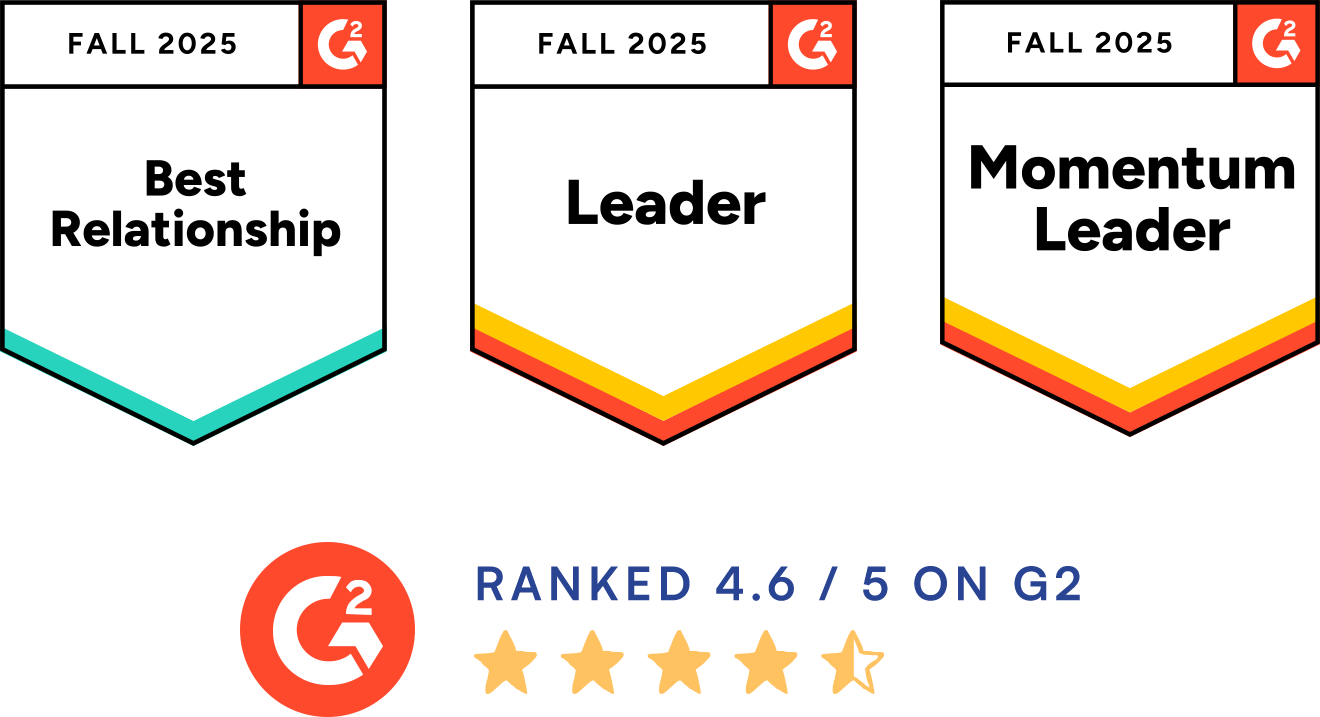Let’s face it: Managing employee issues without the right system is risky. Spreadsheets and manual processes leave gaps, and generic tools weren’t built for the complexity of HR. Case management software for HR fixes that. It gives you a secure, defensible way to document, investigate and resolve workplace issues while surfacing the insights leaders need to act.
In this guide, we’ll cover what case management software for HR is, why it matters and how to evaluate the platforms shaping 2025.
What is Case Management Software for HR?
Case management software for HR is the system that moves your team beyond spreadsheets, emails and tools never designed for HR. It provides a structured, defensible way to document, track and resolve workplace issues — giving HR the visibility and consistency you can’t get from ad hoc methods.
Think about the range of cases HR manages every day: Employee complaints, misconduct investigations, accommodation requests, leave management, union grievances and performance concerns, to name a few. Without the right platform, these cases live in silos, get tracked inconsistently and expose your organization to unnecessary risk.
Case management software for HR brings all of that into one secure system. The best platforms:
- Centralize every case file, note and communication by providing a defensible, secure source of truth
- Standardize steps with workflows that guide even less experienced investigators to handle cases correctly
- Support compliance by aligning with internal policies and external regulations
- Provide analytics that highlight patterns and risks before they escalate
- Create transparency for employees so they know issues are being tracked and resolved
This isn’t about replacing HR judgment. It’s about giving your team a framework that ensures every case is handled the right way, every time — while surfacing the insights leaders need to manage risk and build a fairer workplace.

Why is Case Management Software for HR Important?
Case management software for HR isn’t a luxury — it’s mission-critical. Without it, HR teams are left stitching together cases with spreadsheets, inboxes and one-off notes. That might get you through today but it leaves big gaps tomorrow. Gaps that show up in audits, legal disputes or headlines.
The stakes are higher than most leaders realize. When investigations aren’t consistent, risks pile up fast. Bias creeps in, deadlines are missed and critical details get lost. Employees lose trust when they don’t see their concerns addressed fairly. Leaders are left without the visibility they need to act before small issues turn into costly problems.
The right case management platform changes that. It gives HR a repeatable, defensible way to manage issues while also improving how employees experience the process. Here’s what it delivers:
Consistency
Standardized workflows ensure every case follows the same process. Bias is reduced and outcomes are defensible.
Compliance
Automated tracking and audit trails align cases with both company policy and legal requirements so nothing gets overlooked.
Employee Experience
Knowing HR follows consistent, compliant processes, employees have greater confidence in the outcomes.
Data-Driven Insights
Built-in analytics help HR spot recurring issues, track substantiation rates and surface risk patterns before they escalate.
This software isn’t just about documenting complaints. It’s about protecting your organization from risk while building a culture of fairness and accountability.
Features to Look for in Case Management Software for HR in 2025
Choosing the right case management software for HR means focusing on features that protect the organization, reduce manual work and strengthen employee trust. Picking the wrong platform will cost you time, money and credibility. These are the features that matter most in 2025:
1. Case Tracking and Documentation
Track every case from intake to resolution with a complete audit trail. Documentation includes notes, communications and key milestones so nothing is lost. Standardized processes ensure cases are handled consistently, regardless of investigator experience.
Goal: Ensure documentation is accurate, complete and defensible.
2. Embedded Best-Practice Workflows
Workflows built on decades of employee relations best practices ensure consistency, reduce manual effort and keep your team aligned with compliance standards.
Goal: Reduce errors and make case handling faster and fairer.
3. Analytics and Reporting
Dashboards and reports reveal what’s really happening in your workplace. Spot recurring issues, measure resolution times and evaluate case outcomes. Benchmarking shows how your organization compares to peers by industry or size.
Goal: Improve visibility and make data-driven decisions.
4. Defensible AI
AI should enhance, not replace, HR judgment. Defensible AI supports your team with case summaries to ensure alignment, smart interview questions, writing assistance and hotline support. Unlike black-box tools, defensible AI explains its outputs and flags risks transparently — while keeping humans in control.
Goal: Drive fairer outcomes with AI that is explainable and trustworthy.
5. Security and Access Control
Employee data is sensitive. Look for encryption, role-based access, secure hosting and multi-factor authentication. Security must extend from data centers to user log-ins to keep information airtight.
Goal: Safeguard employee and organizational data while reducing exposure to threats.
Other Must-Haves for Successful Case Management Software for HR
Not every requirement shows up on a features list. These are the elements that separate a workable tool from a strategic platform:
- Integration with HR Systems: Connect seamlessly with your HRIS, ticketing systems and CRM. Manual entry and workarounds create errors and waste time.
- Compliance-Minded: Provide audit trails and defensible records that stand up in court or regulatory reviews.
- Ease of Use: Adoption depends on simplicity. Platform should be intuitive and require minimal vendor support for small adjustments.
- Customer Support: Platform should offer responsive support, regular product updates and a clear investment in the platform’s future.
Goal: Choose a system that fits into your ecosystem, scales with your needs and comes with a partner you can rely on.

What is the Top Case Management Software for HR in 2025?
If you’re evaluating case management software for HR in 2025, you’ll find plenty of options. Some are purpose-built for employee relations, others are retrofitted from compliance or IT service tools. The difference matters. A purpose-built platform will give you defensible processes, data-driven insights and smooth adoption. A retrofitted one may leave you frustrated, forcing workarounds and missed opportunities.
Platform Comparison
| Platform | Strengths | Challenges | Ideal For |
|---|---|---|---|
| HR Acuity | Built for ER and HR, guided workflows and templates, defensible AI, advanced analytics, seamless integrations (Workday, HRIS, SSO, CRM), intuitive interface | Minimal — adoption is fast thanks to user-friendly design | Organizations needing a comprehensive, scalable platform built by ER experts |
| CaseIQ | Investigative tools, configurable workflows, reporting, whistleblower hotline | Limited integrations, slower performance, steeper learning curve | Companies needing advanced reporting and investigative depth |
| AllVoices | Simple and inclusive interface, anonymous reporting options | Limited analytics, customization requires vendor support, scalability challenges | Smaller teams prioritizing transparency and inclusivity |
| Navex (EthicsPoint) | Multiple intake channels (phone, web, chatbot), compliance-focused | Limited ER functionality, constrained customization, few integrations | Organizations starting with compliance reporting rather than full ER management |
| ServiceNow HR Service Delivery | Enterprise-level integrations, dashboards, AI automation, fits ServiceNow ecosystem | Not built for ER or HR, time-intensive customization, steep learning curve | Large enterprises already using ServiceNow needing basic HR case tracking |
HR Acuity
Strengths: Purpose-built for employee relations with guided workflows, templates and defensible AI. Advanced in-platform analytics and benchmarking provide visibility into trends. Integrates with HRIS, Workday, SSO and CRM. Intuitive design keeps the learning curve low.
Challenges: Minimal. Adoption is fast thanks to a user-friendly interface, and defensible AI supports your team while keeping humans in the driver’s seat.
Ideal for: Organizations that want a comprehensive, scalable solution built by ER experts for ER experts.
Why it stands out: HR Acuity is the only platform built specifically for employee relations. It standardizes investigations, strengthens compliance and surfaces insights leaders can act on. Its responsible AI supports, not replaces, HR judgment — making outcomes more consistent and defensible.
CaseIQ
Strengths: Investigative tools, configurable workflows and reporting. Includes whistleblower hotline options.
Challenges: Limited integrations and slower performance in some environments. Learning curve for new users.
Ideal for: Organizations focused on investigative depth and advanced reporting.
AllVoices
Strengths: Simple, inclusive reporting platform with a user-friendly interface. Strong emphasis on anonymous employee input.
Challenges: Reporting and analytics are limited. Customization often requires vendor support. May not scale well for larger enterprises.
Ideal for: Organizations prioritizing anonymous reporting and inclusivity over advanced ER management.
Navex (EthicsPoint)
Strengths: Multiple intake channels including phone, web and chatbot. Established reputation in compliance reporting.
Challenges: Limited ER functionality. Constrained customization and few integrations. Focused more on ethics hotlines than full HR case management.
Ideal for: Companies just starting with compliance reporting, not those needing comprehensive employee relations case management.
ServiceNow HR Service Delivery
Strengths: Robust enterprise integrations, analytics dashboards and AI-driven automation. Fits seamlessly into the broader ServiceNow ecosystem.
Challenges: Not built for employee relations. Requires significant customization and comes with a steep learning curve.
Ideal for: Large enterprises already invested in ServiceNow that need basic case tracking within their existing environment.
Want to learn more about the best HR case management platforms in 2025? Check out this roundup.

What are Red Flags to Watch for When Choosing Case Management Software for HR?
Choosing the wrong platform can set your team back for years. Watch out for these red flags before you commit:
- Rigid workflows: If the system is too rigid, your team can’t adapt processes. If it requires constant customization, you’ll face constant costs and delays. Look for flexibility without complexity.
- Weak reporting: If insights require exports or a data analyst to interpret, you’ll miss the chance to act fast. Robust reporting should be interactive, visual and allow benchmarking against peers.
- AI overload: AI should support, not decide. Tools that label issues or make decisions without human oversight create risk. AI must be transparent and defensible.
- Security gaps: If data isn’t encrypted or access controls aren’t clear, stop there. Employee relations data is too sensitive to leave exposed.
- Poor integrations: A tool that can’t connect with your HRIS or ticketing systems creates silos. That leads to manual entry, errors and wasted time.
- Clunky interfaces: If the platform is hard to use, your team won’t use it. Adoption depends on simple, intuitive design.
- Hidden fees: Extra charges for integrations or “advanced features” can blow up budgets. Pricing should be transparent and predictable.
Bottom line: The right case management software for HR should fit seamlessly into your ecosystem, keep data secure and empower HR to act with confidence. Even one of these red flags is a signal to walk away.
Frequently Asked Questions About Case Management Software for HR
Check out some of the most common questions asked about case management software for HR.
1. What types of cases can case management software for HR handle?
Case management for HR platforms manage a wide range of employee issues: Complaints, misconduct, harassment, accommodations, leave requests, union grievances, performance management and compliance matters, to name a few. Every case is tracked from intake to resolution in one system.
2. How does case management software for HR improve compliance?
By centralizing documentation and creating a clear audit trail, case management software for HR ensures every case follows company policy and legal requirements. That makes it easier to respond to audits.
3. Can case management software for HR integrate with other systems?
Yes. Leading case management platforms for HR integrate with HRIS, payroll, ticketing and CRM systems. This reduces manual data entry, eliminates silos and ensures consistency across your HR ecosystem.
4. What role does AI play in case management software for HR?
AI generates interview questions, supports consistent documentation, enables your team to converse with your data like you would a colleague and provides benchmarking insights. The best platforms use defensible AI that is transparent and never makes decisions on its own — HR stays in control.
5. How does case management software for HR improve the employee experience?
Case management software for HR provides transparency and accountability. Employees know their concerns are tracked, updates are delivered quickly and outcomes are handled consistently. That builds trust in HR’s ability to manage workplace issues fairly.
6. What challenges come with implementing case management software for HR?
Common hurdles include migrating data, driving adoption, customizing workflows and connecting to other systems. Choosing a vendor with strong onboarding and customer support minimizes these risks.
7. How do I choose the right case management software for HR?
Focus on scalability, ease of use, integrations and vendor expertise. The right platform should fit your needs today and grow with you as HR processes evolve.




